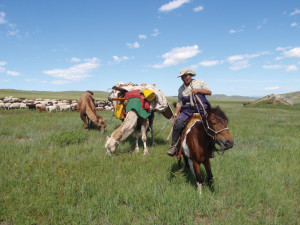Sinclair will host an “International Series” consisting of professors who have travelled abroad immersing students in the culture and customs of other countries. There are three presentations; The first event was September 16 on the topic of Mongolia by Katherine Rowell, The second event will be October 21 on the topic of Puerto Rico by Yolanda Burgos-Olinger, and the third and final talk will be November 18 on the topic of Iceland by Mohsen Khani. Each talk will provide traditional food that relates to their visited country. All presentations will be from noon to 1:00 p.m., in Building 8 on the stage.
The first presentation consisted of Mongolia, where Katherine Rowell, professor of Sociology and Cultural Anthropology at Sinclair, took a 10-day journey to Mongolia in August. Mongolia is the second largest landlocked country in the world resting between China and Russia within Asia. Rowell said imagine not having any access to seaports, no ocean, and no beaches.
Professor Rowell said it took her a day of travel to get there and a day of travel to get back. She landed in the capital city of Ulaanbaatar, commonly known as simply Bator by the locals.. The population of Mongolia is about 3 million people, and Rowell said half of that population resides within the capital city. She spent half the week of her visit at the NorthEast Asian Conference on Peace with a colleague and friend of hers. Rowell said that there were only three other Americans present at the conference. The conference was presented in English, even though that is the second language to the majority of attendants there.
Rowell said it was partly for adventure and for the experience, as well as because her desire to explore Mongolia. Rowell said she was influenced by the movie “Babies,” where a Mongolian baby made an appearance, and she said she instantly fell in love and wanted to go to the country.
Rowell said the country currently faces many obstacles. Mongolia has recently been considered above poverty level, the U.N expects Mongolia to begin repaying any debts they have. Unfortunately, due to that, the Mongolian government doesn’t have enough money to improve their infrastructure, which is currently in disrepair. They also struggle from extremely high pollution counts in their capital city. However, according to Rowell, it’s not all doom and gloom for the Mongolians. The Mongolian people cherish a 98 percent literacy rate, and take pride in that—most Mongolians are bi-lingual, knowing both Mongolian and Russian.
Rowell informed the audience that after the fall of Genghis (pronounced ching-es, not ging-es) Con’s empire, the Chinese sought retaliation. In 1919, the Chinese attempted to invade Mongolia, but the Russians intervened to stop it. Under Russian influence, Mongolia formed the Mongolian People’s Republic, which had heavy Russian influence remaining up to the end of the Cold War. Many of the Mongolian buildings today still bear the Russian language.
The Russians weren’t all knights in shining armor, according to Rowell. She said that during the time of Stalin’s repressions, Soviet Russian Communists killed between 30,000 and 60,000 Mongolian people. The Mongolian people today don’t hate the Russians; however, they have a disdain for the Soviet Russian Communists of that time. Rowell said she wouldn’t get deep into the political atmosphere because that was for another time, but she did inform the audience that the Chinese didn’t get away so easily from their past aggressions against Mongolia. The Mongolian people still have a high mistrust against the Chinese government for their attempt to invade Mongolia multiple times.
Politics aside, Rowell said the rest of her trip was “for fun” and she enjoyed her time immensely. She said she had a small team on her trip. A driver, a translator who is a current student at the University of Mongolia, and her friend that works with the U.N. She said she stayed with nomads during the remainder of her trip. Rowell informed the audience that the nomads of Mongolia don’t need a permit to live on the national park land. The nomads move up to four times a year, their huts can roll up since they’re made out of lamb felt (a compact pliable material). Rowell said she considers herself a vegetarian, but in Mongolia, there is no such thing as a vegetarian. She said she still enjoyed most of the food she had. Rowell said that the best thing she enjoyed was the warm and friendly people who had her as a guest in their homes.
Rowell said she made many friends and was sad to say goodbye to them, but had to get back home to teach for the fall semester at Sinclair. The time difference between Mongolia and the U.S is ten hours, so naturally jet lag was existential. Now that Rowell is back, she said she tells her students about her experience in Mongolia a lot.
Ehron Ostendorf
Copy Editor
